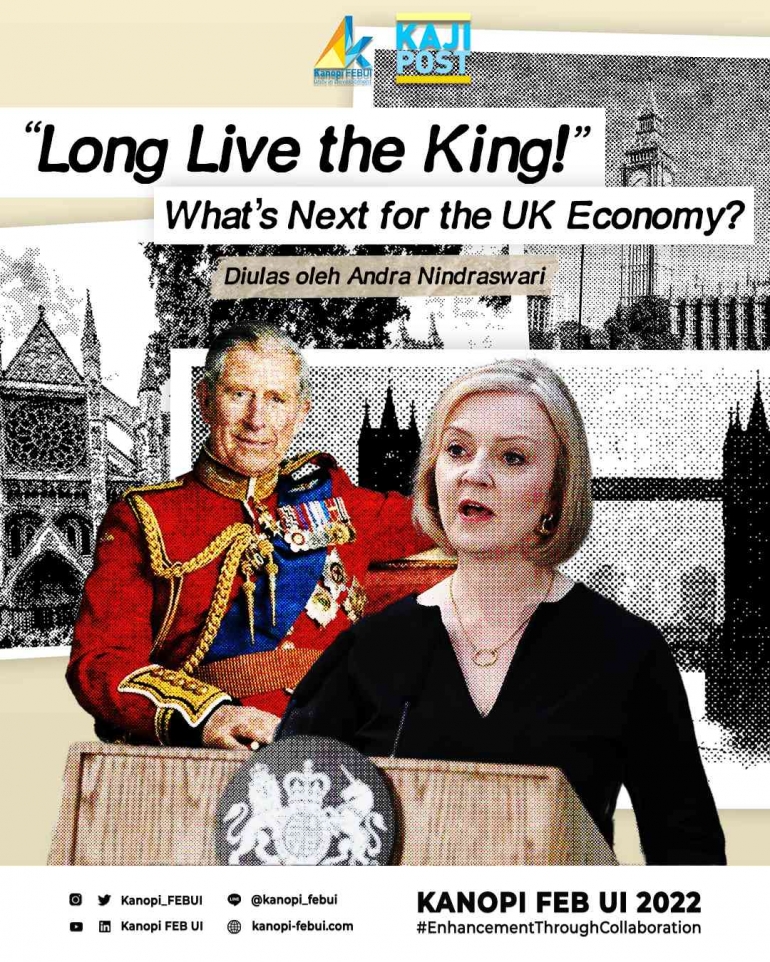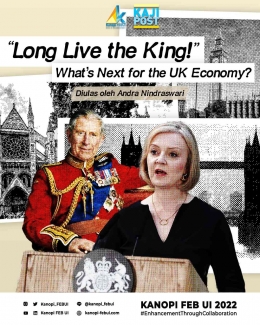About three weeks ago, the world was startled by the passing of Queen Elizabeth II. With the British economy already battling with soaring prices and facing the fear of recession by the end of year, this subsequent period of national mourning has dealt a further blow to Britain's already fragile economy. After the previous Prime Minister Boris Johnson was linked to a series of contentious and ethical scandals, Liz Truss was chosen as the country's new prime minister just two days before Queen Elizabeth II passed away. From now on, King Charles III will have to take charge of this difficult situation as Head of State and give a sense of stability and continuity with the same presence that his mother did throughout her 70-year reign. First, let's take a look at how the UK economy is doing recently.
Is the UK Bracing for Recession?
Prices have increased sharply over the last year domestically. After reaching 10.1 percent in July, the highest level since February 1982, inflation decreased slightly in August but still remained at 9.9 percent on an annual basis. Rising food prices made the biggest contribution, indicating that inflationary pressures are mostly spreading beyond energy. Particularly, Russia's invasion of Ukraine also resulted in significant spikes in gas and food prices globally.
As the FED continues to increase its interest rate to fight US inflation, many central banks in the world seem to have also been tightening their monetary policy. Generally, a country with a higher interest rate will increase the value of its currency relative to other countries with lower interest rates. To curb inflation and maintain the value of its currency, The Bank of England increased its key interest rate from 1.75 percent to 2.25 percent during its meeting in September 2022, marking its seventh consecutive rise.
Higher interest rates also makes the cost of borrowing more expensive. Lenders may benefit from inflation where more individuals will require credit to buy goods and services that are more expensive. After the BoE stated that it will not hesitate to change interest rates to bring back inflation to its targeted rate, the yield on Britain's ten-year Gilt increased beyond 4%, marking its highest level since February 2010. However, credit risk may also be higher for lenders during times of strong inflation.
On the other hand, it may also be a burden for borrowers since an increase in inflation is rarely followed by an increase in wages. Real wages in the UK decreased by 3% annually in the most recent quarter, reflecting the value of employee compensation after taking inflation into account. According to the Office of National Statistics, average pay increased by 4.7% from April to June, excluding bonuses, but the cost of living is rising even more quickly and surpassing income growth. Tighter monetary policies and a decline in real earnings are making it more difficult for people to afford debt.
Financial markets have been unstable, and people's risk taking has decreased as a result of these changes. The effects of high inflation can already be seen: economists are becoming more gloomy about the UK economy and believe that a recession is now far more likely than not. Even The BOE anticipates a recession to occur in the fourth quarter and persist until the first few months of 2024.
UK Inflation: Does Brexit Come Into Play?
Adam Posen, a former Bank of England policymaker, believes that Brexit's effects on immigration and the labor market are responsible for 80% of the UK's high inflation rate, which is the highest of any G7 nation. However, Brexit supporters deny that the present price increase is related to stricter immigration regulations; some believe that the regulations aren't even strict enough.
With the end of free movement, there has been a decrease in the number of immigrants coming to the UK to work in the accommodation and hospitality industry. The new system seems to be succeeding in its goal of tipping the scales in favor of immigrants who have a higher paying and hold jobs requiring greater levels of expertise. Partly as a result, vacancies are prevalent in several relatively low-paying industries and occupations.
For example, the UK care sector which is considered a low-status, low-paid profession is currently having a significant employee turnover. Adult social care had a 5.9 percent vacancy rate in May 2021. This year, it got to almost 10 percent in March. Due to a lack of government financing, social care staff has been experiencing a shortage, which has been made worse by the drop in EU immigration since Brexit.
It is also crucial to keep in mind that employers are unlikely to see a rise in real salaries throughout the whole economy if their only response is to raise nominal compensation without simultaneously raising productivity. This will result in changes to relative earnings, with employees in areas where migrant competition has diminished benefitting and those in other sectors losing, since prices will also need to increase (Portes, 2021).
Brexit's effect on prices and the labor supply can't be denied. Due to higher import costs and fewer employees entering in the same numbers, businesses in the UK are finding it more expensive to import goods from Europe. According to the think tank UK in a Changing Europe, trade limitations imposed as a result of Brexit led to a 6% increase in food prices in the UK between December 2019 and September 2021, which adds more financial burden on households.
Trickle Down Economics: Intellectual Capture or Sheer Incompetence?
After Boris Johnson was linked to a series of contentious and ethical scandals, Liz Truss was chosen as the country's new prime minister just two days before Queen Elizabeth II passed away. An economy already grappling with a cost-of-living crisis will be burdened by time off from work and activities being postponed as the UK mourns the demise of Her Majesty Queen Elizabeth II. However, it is anticipated that an increase in domestic tourism and foreign visitors will lessen the overall impact.
Two days after taking office, Liz Truss declared a cap on household energy bills at about 2,500 per year for the following two years, with the government covering the gap. On September 23, Kwasi Kwarteng, the UK's new finance minister, unveiled the government's strategy in dealing with the rising cost of living that included sweeping tax cuts and scrapping a cap on bankers' bonuses in the "mini budget".
The plan is based on the trickle-down economics theory. Trickle-down economics is a term used to describe the idea that if high earners receive a pay raise, the whole economy would benefit as their wealth and income spread to all facets of society. President Biden expressed his criticism of this economic strategy in a tweet earlier in the week. In a tweet posted on September 20, Biden expressed his displeasure with trickle-down economics, adding that "it has never worked."
The reduction of income taxes for the highest incomes is a crucial component of the trickle-down effect. It is argued that if high earners see a rise in disposable income, they will raise their spending, which will boost demand, create more jobs, and eventually increase everyone's salaries. Businesses may also decide to spend their greater revenues in raising their output. This theory is supported by the Laffer Curve where it suggests that tax revenues may decrease if tax rates are raised because higher tax rates make individuals less likely to work, and therefore would not boost productivity and spur economic expansion.
Trickle-down theory of economics has drawn a lot of criticism. As lower earnings do not receive a comparable tax decrease, the additional advantages the wealthiest receive might promote income inequality. For example, if the trickle-down economics theory really works, everyone should have benefited from the tax cuts under Presidents Reagan and Bush. It turned out that the poorest fifth's after-tax household income did increase by 6% between 1979 and 2005, but the top fifth's earnings rose by 80% and even the income of the wealthiest 1% tripled. It seems like prosperity trickled up rather than trickled down.
According to critics, such policies disproportionately favor the rich. Truss nonetheless stated on Tuesday that she was prepared to be unpopular if it would help revive the British economy. She told Sky News, "I don't accept this argument that cutting taxes is somehow unfair".
How can the UK get out of this wretched situation?
Aside from whether the trickle-down economics will work or not this time, the UK has to focus on increasing its productivity in order to maintain rising living standards and economic growth. In the UK, employment has been rising steadily since the global financial crisis, but productivity growth has stagnated. However, future economic development will depend on how much each employee is able to produce. Overtime, employers must adapt to the new regulations from Brexit by increasing productivity, such as by upskilling employees or transitioning to less labor-intensive goods and services through technology.
The Bank of England is trying its best to press inflation by making their interest rate higher since December. Higher interest rates help push inflation down by making borrowing more expensive, encouraging saving, and therefore reducing spending. Higher interest rates, however, take time to take effect and come with several risks to be taken into consideration.
This is the current economic condition of the UK that King Charles III inherited from Queen Elizabeth II. From now on, King Charles III will have to take charge of this difficult situation as Head of State and give a sense of stability and continuity with the same presence that his mother did throughout her 70-year reign. The monarch, The Bank of England, and British businesses must work together to achieve the expected target of 2% for inflation - for the welfare of the people.
Diulas oleh: Shakuntala Anjani Nindraswari | Ilmu Ekonomi 2022 | Wakil Kepala Divisi Kajian Kanopi FEB UI 2022
REFERENCE
When will inflation come down? Bank of England. (2022, April 28). Retrieved September 30, 2022, from https://www.bankofengland.co.uk/knowledgebank/will-inflation-in-the-uk-keep-rising
Atkinson, A., & Bergin, C. (2022, August 17). UK inflation hits 10.1% for the first time in 40 Years. Bloomberg.com. Retrieved September 30, 2022, from https://www.bloomberg.com/news/articles/2022-08-17/uk-inflation-rises-more-than-expected-to-40-year-high-of-10-1#xj4y7vzkg
Financial Stability Report - july 2022. Bank of England. (2022, August 24). Retrieved September 30, 2022, from https://www.bankofengland.co.uk/financial-stability-report/2022/july-2022
Cantillon, R. (2022, August 18). UK inflation: Is Brexit causing it to accelerate? The Irish Times. Retrieved September 30, 2022, from https://www.irishtimes.com/business/2022/08/18/cantillon-uk-inflation-is-brexit-causing-it-to-accelerate/
Guardian News and Media. (2022, August 3). Spiralling inflation, crops left in the field and travel chaos: 10 reasons Brexit has been disastrous for Britain. The Guardian. Retrieved September 30, 2022, from https://www.theguardian.com/politics/2022/aug/03/spiralling-inflation-crops-left-in-the-field-and-travel-chaos-10-reasons-brexit-has-been-disastrous-for-britain
Guardian News and Media. (2022, April 27). Post-brexit trade barriers increase price of food imported from EU -- report. The Guardian. Retrieved September 30, 2022, from https://www.theguardian.com/politics/2022/apr/27/post-brexit-trade-barriers-increase-price-of-food-imported-from-eu-report
Amadeo, K. (n.d.). Does trickle-down economics work? The Balance. Retrieved September 30, 2022, from https://www.thebalancemoney.com/trickle-down-economics-theory-effect-does-it-work-3305572
Constable, S. (2022, September 23). Queen Elizabeth II's death slowed action on economy in turmoil. Time. Retrieved September 30, 2022, from https://time.com/6215674/britain-turmoil-economy/
Nevett, J. (2022, September 23). Kwasi Kwarteng's mini-budget of tax cuts reward the wealthy, labour says. BBC News. Retrieved September 30, 2022, from https://www.bbc.com/news/uk-politics-63007423
Authors , Authors, & Jonathan Portes King's College London and UK in a Changing Europe View Profile. (2022, July 13). How is the post-Brexit immigration system affecting the UK economy? Economics Observatory. Retrieved September 30, 2022, from https://www.economicsobservatory.com/how-is-the-post-brexit-immigration-system-affecting-the-uk-economy/
Follow Instagram @kompasianacom juga Tiktok @kompasiana biar nggak ketinggalan event seru komunitas dan tips dapat cuan dari Kompasiana
Baca juga cerita inspiratif langsung dari smartphone kamu dengan bergabung di WhatsApp Channel Kompasiana di SINI







